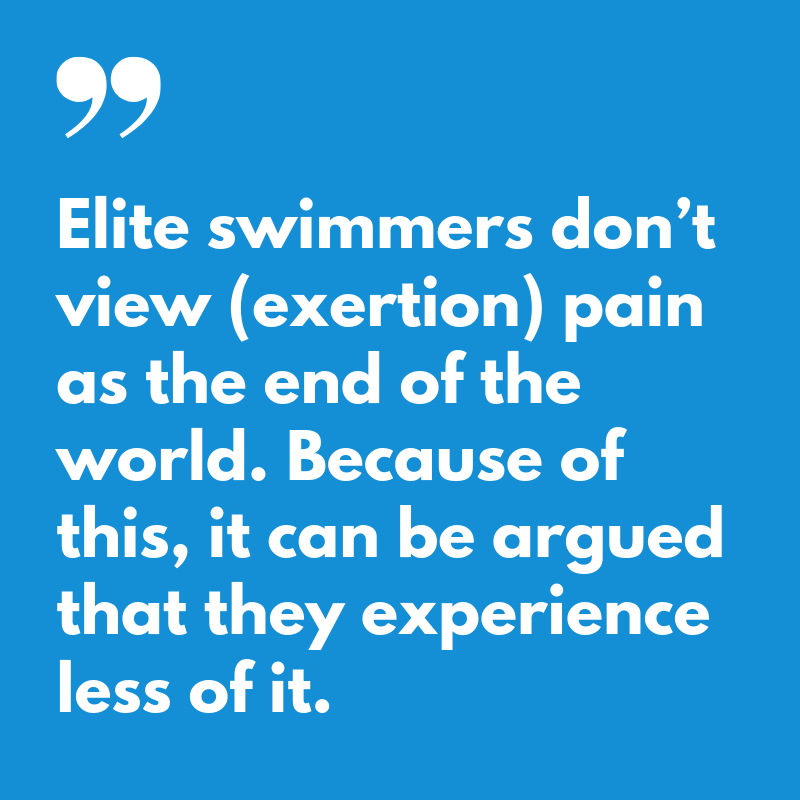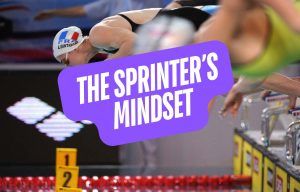That was the hardest workout, ever.
Oh my God, that set was brutal.
That main set was absolute torture.
There’s no mistaking that the sport of swimming is challenging.
Physically, for the fact that we use our whole body, hold our breath, and perform a complex series of skills and movements that are not natural to humans.
Mentally, the sport is just as tough: staying focused, kicking through cement-legs, the huffing and puffing from high-end aerobic work, the agony, discomfort and fair-trade struggle.
As a result, learning to deal with discomfort and pain is part of the deal.
We head to the pool, dip into our bag of tricks, and do our best to withstand the discomfort:
- Sing a high-BPM song to ourselves to distract ourselves (RiRi’s “We Found Love” was my jam this morning during a set of threshold 100s).
- Use motivational self-talk to try and stay positive (“I can do this! I can do this!”).
- Get mad about a race we lost in the past and use the anger to fuel our effort (“This one is for you, lane 5!”).
But, as it turns out, the way that we perceive and predict pain and discomfort has a huge effect on how we end up experiencing it.
When we expect that hard workout to be super painful, and we reflect on it as being super painful, research tells us that we will actually be sorer and more fatigued in the moments and days to follow.
Fearing the pain makes you experience more pain.
A group of researchers [1] sat down with a group of NCAA athletes and had them do a heavy workout after a week off. The time off would mean the workout would generate some soreness.
Before the workout, the athletes filled out a series of questionnaires and then rated their pain (soreness) 24 and 48 hours after the workout.
Unsurprisingly, the athletes who feared the pain and were more worried about the effects of it, rated themselves as sorer in the days following the workout. When athletes were a little less worried about the pain, and didn’t fear the effects of the workout, they rated the pain as being less ouchie.
While this paper doesn’t suggest that simply viewing normal pain and soreness as something you can completely mind-over-matter like some sort of magic trick, it does show that your perception of pain predicts how much of it you will experience.
If you think something is going to really hurt, and you tell yourself that it really hurts, then guess what?
It’s gonna hurt, yo.
The implications and the possibilities of knowing this can explode across your swimming.
After all, if you have a less fearful approach to exertion pain, experience less of it, and because you are more willing to chase it in swim practice, you are going to reap the benefits of training at a higher level more often.
While easier said than done, there are some things you can start doing at practice today that will help you be less stressed and fearful of the pain.
Consider the language you use before and after challenging sets.
Your coach has written a long best-effort set on the board. You take a big breath, picturing yourself heaving air into the gutter after each rep.
At which point, your coach draws a bracket around the set and writes: “3x.”
In these moments, it’s understandable that your first thought it gonna be, “Yup, today is the day that I die in practice.” Instead, take a breath, and get curious about what you can do.
The self-talk should extend to the way you describe and view the set and workouts once they are done, too. As opposed to, “Ugh, that set was impossibly hard” try something like, “Okay, that wasn’t so bad.”
This little tweak in your talk can influence how your body responds to a beating in the water and also better position you mentally for future workouts. When you play down discomfort, you are less fearful of it, and you get a sense of competency and confidence that you can’t get by brooding about how much a set hurt.
When you write down your practice in your log book, use language that leans towards, “challenging but I did it” as opposed to “I feel like a bag of smashed pull-buoys.”
To paraphrase a Henry Ford quote:
One lap and one stroke at a time.
When you step back and look at the entirety of a really hard workout, it’s hard not to get demoralized. All those meters.
Especially when it’s one of those workouts where you know that you are going to get pushed to the brink.
But instead of ruminating on the sum of the workout, take things one lap at a time. Focus on your effort and stroke as it pertains to this length, and this length alone. This kind of focus is not easy, but it’s a proven way to get more from yourself and better manage your perceptions of pain.
After all, the pain of a whole workout is almost impossible to digest, but the pain from the current lap? From a few stroke cycles?
Yeah, you can handle that.
Remind yourself that you have done harder.
When swimmers over-estimate the pain ahead, they short-change effort.
Because they expect a set to hurt like a son of a gun, they do the first few reps or rounds at a cautious rate. When they think a race will destroy them, they are hesitant to take it out, usually leaving effort in reserve.
In both cases, it’s an opportunity lost.
When you are standing face to face with a tough set or race, and that voice of “oooohh buddy, this is going to feel the worst” starts to rise up, remind yourself that not only are you going to be fine after, but you’ve done harder sets and races in the past.
More Stuff Like This:
Bring the Pain: Dealing with the Agony of Hard Swim Practices and Races. Stuck getting overly worked up about how hard those sets and practices are going to be? Here are some more tips and strategies to navigate the discomfort.
How to Prepare for the Moments in the Pool When Things *Really* Hurt. We all experience it at one point or another in training and competition: the moment where our shoulders and legs lock up and we die. Here’s how to be mentally prepared to conquer that moment.















